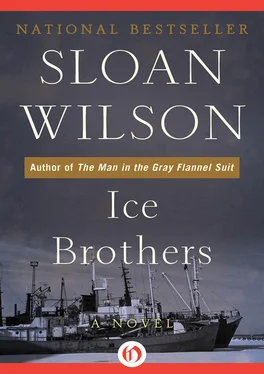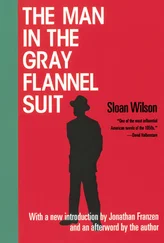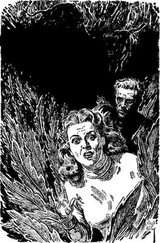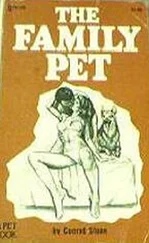Charles’s studio consisted of a back porch which had been glassed in, and which was heated by a pot-bellied coal stove on which an aluminum coffee pot steamed. Near the door stood an easel with a half-finished abstract painting, black and red lines leading to a huge sphere which had only been sketched in. The painting had not been touched since Paul’s last visit a month ago. This large canvas acted as a screen, behind which Charles was sitting in an armchair near the stove. He was carving a long chain from a pine two-by-four. This was something which he did very well. The part of the chain which he had finished and which lay coiled at his feet, was as flexible and perfectly formed as its iron counterpart.
“Paul!” he said, getting to his feet. “Or should I call you captain?”
His father was a stout man as tall as himself, almost six feet, and Paul couldn’t understand why he persisted in thinking of him as small. He was wearing a tweed sports coat, a black turtleneck sweater and baggy gray flannel trousers. His long silvery hair and his craggy long-nosed face with heavy dark eyebrows enabled him to play his assigned role as a distinguished artist convincingly, whether he really wanted to or not.
Paul shook his father’s hand heartily — they never hugged. Rather embarrassedly Charles took a pipe from his pocket and began to stuff it.
“Your grandfather would be proud of you,” he said. “He always wanted me to go in the navy. I tried, but my bum ticker ruled me out. How long will it be before they send you overseas?”
“I expect my orders anytime now. I don’t actually know where I’ll be stationed.”
“He’s in the Coast Guard, not the navy,” Rachel said. “They may keep him right in Boston.”
“During wartime we’re part of the navy,” Paul said. “I’ve already put in for sea duty.”
“Well, you’re better qualified for it than most,” Charles said. “It’s nice to think that the old Valkyrie did you some good. Bill thinks we should junk her now. Did he tell you that?”
“He’s talked of it.”
“He’s even got a buyer. Three thousand dollars we’re offered. Jesus Christ!”
“Now, Charles, you mustn’t take on about that,” Rachel said. “The Valkyrie has served her purpose. She’s given us all a great deal of pleasure for years and she’s an old lady. Everyone has to die sometime.”
“Three thousand dollars for a sixty-foot Lawley yawl,” Charles said. “The buyer is the Katstein Metal Works. Sic Transit Gloria. ”
“I say we’re lucky to get the three thousand,” Rachel said. “Who’d look after her after Paul goes? Who knows how long this war will last?”
“I guess I have to vote for selling,” Paul said. “She’s got some rot in her, Dad. There won’t be much left of her in two or three years.”
“Let’s talk about something cheerful,” Rachel said. “How about some tea, and I’ve just baked an apple cake.”
“While you’re getting that together, I’d like to show Paul the model I’m making in the basement,” Charles said and led the way down a steep, rickety stairway.
This cellar was far different from that in the orderly house of his father-in-law. One corner was filled with a jumble of unstacked firewood, another with coal. They had to pick their way through broken chairs and tables to get to the workbench, where tools lay everywhere but in their racks. The half-model of the Valkyrie which Charles had carved from a piece of mahogany was as smooth as flesh. Paul was touched by the fact that both his father and father-in-law had spent hours making models of the old yawl.
While Paul was running his fingers over the graceful model, Charles produced a half-empty pint bottle of scotch from a tool drawer.
“Your mother doesn’t think that this stuff is good for my ticker, but a snort now and then never hurt anyone. Here’s to your new career. I bet you’re good at it.”
Passing the bottle back and forth with curious urgency, they finished it. Then Charles took two big cigars from the tool drawer.
“Your mother can’t stand the smell of these, but I like one now and then,” his father said. “We have to be careful, though. The smoke can go right up through cracks in the floor and make her sick.”
An armchair with a broken arm already stood in front of the furnace. Charles pulled a diningroom chair with a split back up beside it. Sitting down, he opened the furnace door, lit his cigar and blew the smoke into it.
“Sit down, son,” he said. “This way we won’t bother anyone. Sometimes it’s good just to sit and smoke a fine cigar.”
Ten minutes later his mother called them for tea. She had set out her best Spode china and a variety of cookies, as well as apple cake. An alcohol flame burned under the silver teapot in gimbals which she had inherited from her grandmother. On that winter day not much light came through the pine trees and the gray curtains at the windows. The armchairs and tables in the room had been designed for a much larger house and made this cottage feel cramped. Silver frames showed pictures of Bill in academic dress as he graduated from Milton Academy, Harvard, and the business school. There were no pictures of Paul, but then he had never graduated from anything except the local high school. On the walls were photographs of both his grandfathers, both successful businessmen, and both looking the part. A scrapbook containing newspaper clippings and photographs which Rachel had garnered from her career as president of the Federated Garden Clubs of America was on a coffee table in front of the couch. Over the fireplace was a large painting of the Valkyrie under full sail on an improbable blue and waveless sea, one of his father’s first efforts. Silver loving cups which Bill had won at tennis, golf, and swimming lined the back of a sideboard. They, like the silver tea set, had all been recently polished. This was really a trophy room, not a livingroom, Paul thought. The sideboard with its candles looked like an altar to success, every little success the family had ever known to make up for the big ones which had been for so long lacking. Paul was sure that soon a photograph of himself in uniform would be added to the collection.
“How’s Sylvia?” his mother asked suddenly and dutifully.
“She’s fine,” Paul said.
“It must be hard for her to have you going away,” Rachel added.
“I’m sure she’s very brave,” Charles said.
“I think I better go to her now,” Paul said. “She hasn’t seen my new uniform.”
“There’s just one more thing,” Charles said. “This man Katstein will want you to sign some papers and show him over the boat if he’s really going to buy it. When can you meet him?”
“Better make it as soon as possible. Like I said, I expect my orders any day now.”
As Paul hurried toward his car, his mother said, “Wait just a minute. I want to take your picture. I’ll have it enlarged and send a copy to Sylvia.”
He stood almost at attention while she fussed with her box camera. Brushing aside a nasty premonition that this was probably the photograph which would appear in the newspapers when he got killed, he forced himself to smile at his mother’s command. When the shutter had finally been snapped, he gave both his parents a hasty kiss, climbed into his car, and with supreme self-discipline did not allow himself to speed out of their driveway as though pursued by demons.
CHAPTER 4
As Paul drove home to show his new uniform to his wife, he could not get out of his mind the picture of his father sitting in a broken chair in the cellar puffing cigar smoke into the furnace. He had always loved his father with an intensity which made him want to cry when he thought about him too much, but he also had done his best, he realized suddenly, to make himself the direct opposite of him. One thing Paul never wanted to do, one thing he had avoided since the age of fifteen, was to take money from his mother, or any woman. As a matter of fact, he could have paid for his own uniforms. While he was driving away from his parents’ house, he began to wonder why he had presented his mother with this bill when he had handled all others himself. Did he somehow resent the fact that she always had tried too hard to drive him toward equaling all the conventional successes of his brother, and now that he had a commission for her to boast about, was he meanly trying to charge her for it?
Читать дальше












